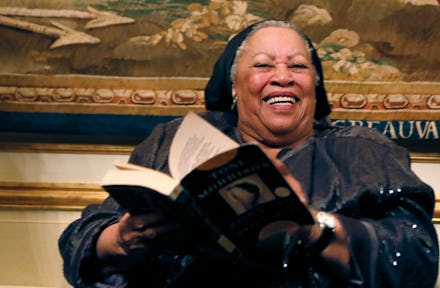Toni Morrison's 'Beloved' Was Called "Vile" and "Moral Sewage" by a Virginia Lawmaker

Toni Morrison's 1987 novel Beloved, a Pulitzer Prize-winning work of fiction about a slave woman who kills her two-year-old daughter rather than let her be brought into a life of slavery, is widely considered to be a modern American classic. Awarding Morrison the Presidential Medal of Freedom in 2012, President Barack Obama specifically named it as an example of a work that "reaches us deeply, using a tone that is lyrical, precise, distinct, and inclusive."
But amid the debate over a proposed Virginia state law that would require K-12 schools to issue "sexually explicit" warnings to parents before controversial reading assignments and provide alternative literature, one Republican legislator took the opportunity to smear Morrison's celebrated book as a work of moral perversion.
Read more: Toni Morrison Summed Up What Some Are Getting Wrong About 'Political Correctness' Today
Loudoun County, Virginia AP English teacher Jessica Berg contacted Virginia State Senator Richard Black to express her concerns over the bill, specifically citing the importance of Beloved, Gawker reports. But instead of the short, polite, boilerplate-type replies constituents have come to expect from elected officials, Black opted for the "confrontational broadside" method.
Here's part of the letter, in which Black describes the novel as "moral sewage" and "disgusting" enough to shake even grown men, below:
I was surprised by your personal advocacy of the book Beloved. That book is so vile — so profoundly filthy — that when a Senator rose on the Senate Floor and began reading a single passage, several other Senators leapt to their feet to interrupt the reading. Susan Schaar, the Senate Clerk, quickly had embarrassed Senate Officials rush the teenage Senate Pages from the Senate Floor in order to protect them from exposure to this moral sewage.
In another followup email provided to Gawker, Black called Berg "appalling and arrogant" for her opposition to the bill.
"I want teachers who won't teach such vile things to our students," Black wrote. "Slavery was a terrible stain on this nation, but to teach it does not mean you have to expose children to smut."
"Slavery was a terrible stain on this nation, but to teach it does not mean you have to expose children to smut."
Black's office also provided Gawker with a checklist of Beloved's supposed moral infractions, which include "references to bestiality: eight (cows and goat)," the number of times swear words or racial slurs appeared, and "references to breasts: 38."
Despite Black's passing mention of the horrors of slavery, he doesn't appear to acknowledge Morrison's book exists in large part to convey the terrible weight of that history. His office did not confirm whether Black has actually read the book.
But censorship is nothing new to many writers of color who earned their controversial status by challenging conservative social mores. One of the most famous black American writers, Langston Hughes, offers up a relevant quote in a different context — discrimination against black writers in the entertainment industry in the 1930s and 1940s.
"We Negro writers, just by being black, have been on the blacklist all our lives," Hughes said in 1957 speech. "... Censorship for us begins at the color line."
More broadly, Black's letter seems like a perfect case in point over exactly why allowing the most easily offended to determine what the rest of us should be allowed to read is a bad idea. Gov. Terry McAuliff vetoed the bill over censorship concerns on Monday.
h/t Gawker